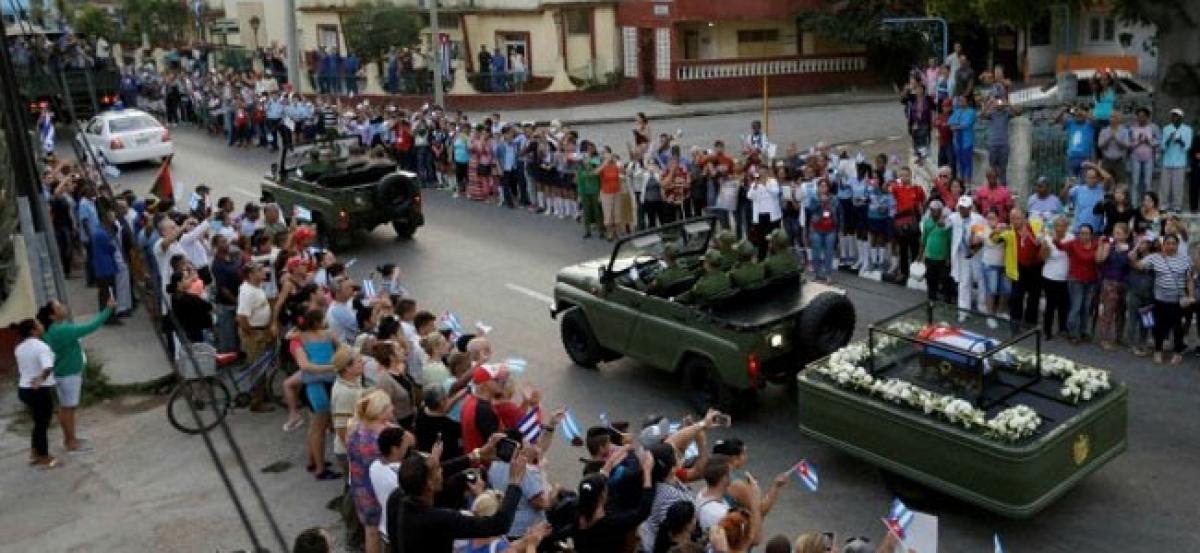Live
- CBI Court Grants Permission for Vijayasai Reddy's Foreign Trip
- Cambodia calling: TGCSB nabs UP man for job fraud
- CM Revanth birthday celebrated grandly in Bellampally
- Karimnagar: Bereft of facilities, hostel kids shiver in biting cold
- Incubation centre to support startup culture
- Seminar on Nehru tomorrow
- ‘Kara Jayantutsavam’ to be celebrated on Nov 30
- Adani Port achieves a new record in timber log handling
- MyVoice: Views of our readers 9th November 2024
- From ‘Mohabbat ki Dukan’ to ‘Jhoot ki Dukan’: Shift In Rahul’s Rhetoric
Just In

Tens of thousands of Cubans greeted Fidel Castro\'s funeral cortege on its journey across Cuba on Thursday, unflagging in their admiration for one of the towering figures of the 20th Century who is equally loathed by his adversaries.
Tens of thousands of Cubans greeted Fidel Castro's funeral cortege on its journey across Cuba on Thursday, unflagging in their admiration for one of the towering figures of the 20th Century who is equally loathed by his adversaries.
Waving flags and singing the national anthem, Cubans thickly lined pastel-coloured colonial streets to pay their respects to Castro. He died on Friday at age 90, a decade after stepping down as president but defiant to the end toward the United States, the world power he tormented from just 145 km away. The government declared nine days of mourning for the man who built a Communist state, aligned Cuba with the Soviet Union and survived what his government claimed were more than 600 US assassination attempts.
The cause of his death has not been made public, but Castro had been weak since an intestinal ailment believed to be diverticulitis forced him to relinquish power in 2006. The outpouring from ordinary Cubans contrasts with the hatred of many Cuban exiles who saw Castro as a tyrant who jailed opponents and ruined the economy with socialism.
Whether out of revolutionary zeal, nationalist pride or a sense of obligation in a one-party state that tolerates little dissent, Cubans have poured onto the streets to bid their final farewell. "I was born with him, I lived with him, and I wanted to die before him," said Ivan Castillo, 44, a public health worker.
He carried his 6-year-old son with the words "I am Fidel" across his forehead, a repetition of a phrase that has become the national slogan for the mourning period, shouted from streets and squares. "Now it's on those of us who lived with Fidel to teach the youth to continue fighting for his ideals," Castillo said, in the city of Camaguey, where Castro's ashes will stay overnight 542 km east of Havana.
On Wednesday, his casket spent the night alongside the remains of Che Guevara in the city of Santa Clara. The procession was slowly making its way east, destined for the final resting place of his ashes in Santiago de Cuba, where Castro's rebels first launched an attack on the US-backed forces of Fulgencio Batista in 1953. Batista was finally driven from Cuba on January 1, 1959, and the cortege is retracing the trek Castro made from that day until he arrived in Havana a week later.
Castro would go on to build a healthcare system for the poor, he sent doctors around the world but also soldiers to Africa to help Namibia achieve independence and weaken apartheid in South Africa. Many lined up for hours on Monday and Tuesday to pass through a memorial in Havana's Revolution Square. Tens, if not hundreds of thousands, gathered there on Tuesday night for a four-hour ceremony in which presidents from around the world delivered eulogies.

© 2024 Hyderabad Media House Limited/The Hans India. All rights reserved. Powered by hocalwire.com







